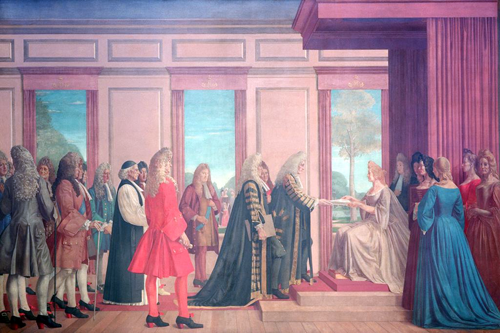 |
| The Acts of Union were not nearly as civilised as Walter Thomas Monnington imagined |
But it is interesting to note that many of those who do not believe the Scots deserve a referendum on the question of independence from the Great Britain are the very same who argue the UK is being absorbed into a Continental Union without its people's consent.
The irony is, the Kingdom of Great Britain was brought into the world in a manner strikingly similar to that with which the EU is currently constructing itself. Namely through bribery, deceit, corruption and in a vacuum of democracy.
It may have been 300, rather than 40, years ago - and the fruits of Union may have been plenty - but the fact remains; Scots have never actually had a say on whether they wanted to be in the Union. Shouldn't someone have asked them by now?
It is, of course, a fair point to make that, in 1707, democracy will never have been on the cards. There were still some 70 years to go before the American Revolution and democracy was still seen as an ancient, dangerous and infantile idea.
But that does not make what transpired any more palatable. The fact remains that Union was incredibly unpopular in Scotland. Despite the country's dire straits and the clear economic advantages of Union, the vast majority of Scots were vehemently against being absorbed by the auld enemy and effectively losing their country.
Indeed, the Act of Union was only passed by the Scottish Parliament because the English Exchequer had enriched many of its MPs - a number of which had accumulated large debts following the very Darien disaster that prompted the issue of Union in the first place.
Sound familiar? EU pay and pensions are exceedingly generous for good reason - money encourages loyalty in weak men and makes it far easier for them to betray their country and people. In this sense there really is no difference at all between what the Duke of Queensbury did then and what everyone from Edward Heath to David Cameron have done since the 1970s.
All the arguments which call for the British people to have their say on membership of the European Union apply in equal force to Scotland. As Alex Massie points out, on the Spectator blog, it is no good telling Scots that Union is for their own good and that they get a bloody good deal financially from England.
Apart from the fact that this is one aspect of Union least likely to engender loyalty in the Scottish breast, it is very much like David Cameron's response to calls for an EU referendum - namely, I think Brussels is good for us, so you don't get a say. If the mutual benefits are so obvious, are we not confident of putting them to the test? Nick Clegg used to think so.
It is interesting to note, too, that it is often Alex Salmond and the SNP portrayed as splitting up the Union, not the Scottish people. This must surely be due to the fact that polls consistently show a lack of enthusiasm among Scots for separation. But the point remains; they have a right to be asked.
The argument over whose terms the referendum ought to be conducted displays a similar level of hypocrisy. Would any Unionist eurosceptic feel comfortable with a referendum on EU membership being conducted by Brussels rather than Westminster? No, I didn't think so.
None of this is to say this writer is against the Union. On the contrary, I agree with David Cameron that it has served the people England and Scotland greatly and has much yet to offer us. But Scottish membership of Great Britain and UK membership of the European Union are twin issues. And in both cases it ought to be the people, not the politicians, who decide.

No comments:
Post a Comment